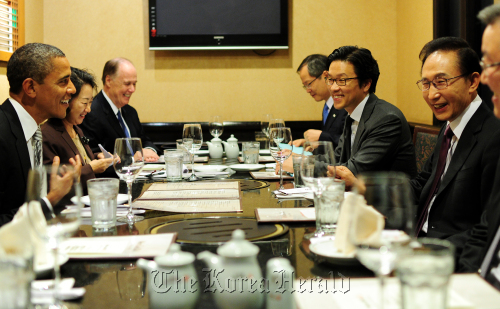WASHINGTON (Yonhap News) ― The Barack Obama administration and Congress have demonstrated their commitment to a stronger alliance with South Korea, not just militarily but also economically, by completing the long-overdue process of endorsing a free trade agreement in time for President Lee Myung-bak’s state visit here, officials and experts said Wednesday.
“Today’s historic vote by the U.S. House of Representatives and the U.S. Senate to approve the KORUS FTA heralds a new era in the alliance,” South Korean Ambassador to the U.S. Han Duck-soo, said in a statement. “Our two countries will embark on a path of co-prosperity and strengthened relations.”
He expressed his gratitude to Obama for his leadership and to legislators for their bipartisan support.
For Capitol Hill, often embroiled in partisan strife ahead of next year’s presidential election, the passage of the FTA, signed in 2007, marked the return of some political trust.
Obama, who took a dim view of free trade as a presidential candidate, pushed for additional negotiations on the FTA signed by the Bush administration. In late 2010, Seoul and Washington struck a deal on the new terms for auto trade to reflect Obama’s hope for South Koreans to drive more American cars.
Obama, however, waited several months before submitting the FTAs with South Korea, Colombia and Panama in pursuit of political assurances that Congress will keep alive the Trade Adjustment Authority, aimed at helping workers displaced by trade. The Republican members of Congress questioned the effectiveness of the US$1-billion-a-year program.

South Korean President Lee Myung-bak (second from right) enjoys an unofficial dinner with U.S. President Barack Obama at Woo Lae Oak, a Korean restaurant, in Virginia on Wednesday. (Yonhap News)
The president sent the implementing bills on the FTAs to the Capitol Hill on Oct. 3, strongly indicating a political consensus on the fate of the TAA.
The Republican-controlled House backed the FTAs and the renewal of the TAA on Wednesday, a day before Lee holds summit talks with Obama and addresses a joint session of the two congressional chambers.
The FTA with South Korea was supported by 278 representatives, while 151 others voted against it. Hours later, the Senate passed it in an 83-15 vote.
It took only a week for Congress to wrap up the legislative process.
“In terms of the economic agenda per se, I think the free trade agreement was the main accomplishment, as it was clearly accelerated to try to get it through both houses of Congress before the president’s visit,” Edward Alden, a researcher at Council on Foreign Relations said. “This was one potential deadline.”
The passage of the accord was a political feat for Obama, who is eager to expand exports and create jobs amid economic troubles.
The FTA is estimated to generate US$10-11 billion in new U.S. exports annually and create at least 70,000 new American jobs, according to various think tanks. They said South Korea will likely see its gross domestic product expand by an additional 5.66 percent in the long term.
For the South Korean leader, who has made constant efforts to bolster the alliance with Washington, it is viewed as a major diplomatic achievement.
“The FTA would expand the bilateral relationship with critical partner South Korea beyond traditional military ties, be an important U.S. bridgehead into the broader Asian market, and serve as a powerful statement of the U.S. commitment to East Asia at a time when many perceive declining American interest, presence and influence in the region,” Bruce Klingner, senior researcher at the Heritage Foundation said.
John Park, analyst at the U.S. Institute of Peace, also pointed out that the congressional move “reaffirms the U.S.’s long-term commitment to its Korean ally and demonstrates to China that the U.S. remains a critical economic player in the important growing Asia-Pacific marketplace.
The question now is when South Korea’s National Assembly will ratify the FTA.
The ruling Grand National Party is pushing for the ratification within this month to put it into effect in January. But liberal opposition parties demand more time to review the accord expected to have a negative impact on farmers.
“The National Assembly is controlled by the ruling party but we are moving closer to the political season in South Korea with legislative elections coming up in April,“ Scott Snyder, researcher at the CFR noted.
“And so I expect there will be a lot of noise surrounding the issue of passage as it is taken up following the ratification the U.S. Congress, but that in the end it should be possible for the Lee Myung-bak administration to push it through,“ he added.






![[KH Explains] Hyundai's full hybrid edge to pay off amid slow transition to pure EVs](http://res.heraldm.com/phpwas/restmb_idxmake.php?idx=645&simg=/content/image/2024/04/18/20240418050645_0.jpg&u=20240419100350)